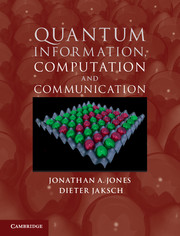As we tread deeper into the intricate tapestry of modern physics, one might ponder: What if, instead of classical bits that define our current computational landscape, we embraced the ethereal elegance of quantum bits, or qubits? This tantalizing prospect defines the realm of quantum computation and quantum information, merging the fields of computer science and quantum mechanics in a confluence that promises to revolutionize how we think about processing information. Yet, herein lies a challenge: How do these quantum phenomena translate into practical computational advantages, and what implications do they carry for the future of technology?
At the heart of quantum computation lies the quantum bit, or qubit. Unlike a classical bit that dominantly represents either a 0 or a 1, a qubit exists in a superposition of states. This dual potentiality allows qubits to perform multiple calculations simultaneously, significantly enhancing computational power. The superposition principle, drawn directly from quantum mechanics, imbues qubits with a capacity for parallelism unattainable in classical systems. When a qubit is measured, it collapses to one of the two states, yet before measurement, the realms of possibility proliferate exponentially with each additional qubit introduced into the computational quagmire.
Entanglement, the second pillar of quantum information, presents another fascinating phenomenon. It refers to a quantum state where the properties of one particle are inherently tied to another, regardless of the distance separating them. This nonlocal characteristic allows for instantaneous correlations, creating a web of interconnected qubits that can communicate and share information with incredible efficiency. Hence, entanglement is crucial not just for quantum teleportation experiments but also for error correction and quantum communication protocols. Herein lies a playful challenge: Can we harness entanglement to build robust quantum networks, addressing the vexing issue of information security that plagues classical systems?
Quantum algorithms emerge as the building blocks for realizing the potential of quantum computation. One of the most notable is Shor’s algorithm, which asserts that certain classes of problems, particularly those involving factoring large integers, become computationally trivial for quantum computers compared to their classical counterparts. This effervescence presents potential threats to current cryptographic practices, shaking the very foundation of information security protocols used today. What steps must societies undertake to fortify their systems against such vulnerabilities? Exploring this question brings us into the crux of quantum cybersecurity, a discipline that seeks to adapt and evolve traditional security measures in light of newfound quantum capabilities.
Grover’s algorithm is another milestone in the quantum realm, showcasing the ability to accelerate search functions quadraticly. In contrast to classical algorithms, which require linear time to explore unsorted databases, Grover’s algorithm reduces this to a square root time complexity, singularly elevating efficiency. However, this also poses a fundamental question: How can industries implement quantum algorithms to enhance existing structures? In fields such as drug discovery and materials science, where the complexity of simulations often renders classical approaches futile, there lies an opportunity for quantum engineering to create transformative breakthroughs.
The hardware requirements for building a quantum computer represent a formidable challenge that researchers continue to tackle. Various physical implementations of qubits have proliferated, including superconducting circuits, trapped ions, and topological qubits, each exhibiting distinct advantages and shortcomings. The journey to scalable quantum computers hinges on developing error-correction schemes that can counteract the decoherence processes and noise that plague quantum systems. Remarkably, researchers have begun to explore hybrid models integrating classical and quantum architectures to facilitate this journey, posing an intriguing question: Can a symbiotic relationship between classical and quantum computing emerge, harnessing the strengths of both paradigms while compensating for their respective weaknesses?
Quantum information theory also deserves mention, presenting the mathematical underpinnings that encapsulate how information is quantified and manipulated uniquely in quantum systems. This intersects with the concept of quantum entropy and the No-Cloning Theorem, which states that an arbitrary unknown quantum state cannot be copied precisely. These principles generate unique insights into the transmission and preservation of information, echoing deep implications for our understanding of reality itself. Such revelations usher in questions relating to the ontology of information: If our understanding of quantum information continues to evolve, how does this inform our broader philosophical and scientific discourse regarding the nature of knowledge?
As scholars and practitioners delve into the multifaceted domain of quantum computation and information, the intersection with classical paradigms illuminates the potential for hybrid solutions that could redefine entire sectors. Industry leaders and emergent start-ups are currently assessing how they can utilize quantum advantage to innovate and streamline operations, all while grappling with the ethical implications of such technologies. The nascent field of quantum machine learning amplifies this discussion, blending insights from both fields to develop algorithms capable of processing vast datasets with unprecedented speed.
Ultimately, the enticement of quantum computation and quantum information lies not simply in the allure of faster calculations, but in the paradigm shifts it engenders across scientific, philosophical, and technological landscapes. As the quest to unravel the complexities of quantum phenomena continues, and as new inquiries arise, the dialogue surrounding these topics becomes ever more critical. Engaging with quantum theory requires not only technical acumen but an imaginative leap, inviting participants in this academic discourse to challenge preconceived notions of computation, security, and information itself.












